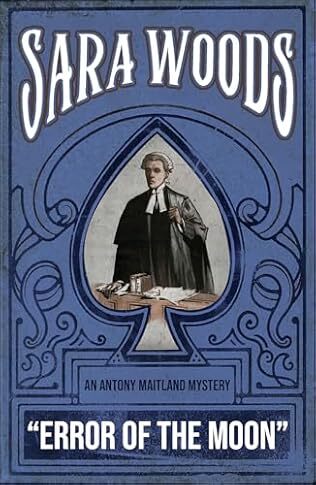Error Of The Moon

A review of Error of the Moon by Sara Woods – 250211
“It is the very error of the moon; she comes more near the earth than she was wont, and makes men mad”, wrote Shakespeare in Othello (Act V, Scene II) and Sara Woods’ tale, originally published in 1963 and reissued by the rejuvenated Dean Street Press, is one of a series of events that leads to madness. As much a thriller as a murder mystery, Woods has rung the changes, lifting her sleuth, Antony Maitland, from the serenity of the ivory towers of the Temple into the muck and brass of industrial espionage.
As a consequence we lose his mental sparring with his larger than life uncle, Sir Nicholas, but by way of compensation we have the opportunity to spend more time with Antony’s wife, Jenny, who accompanies him on his assignment to give some credibility to his guise as a newly appointed Assistant Secretary of the General Aircraft Company (GAC). Those of us who have been following the series will already be familiar with Antony and Jenny’s war service, the injuries and mental scars they both bear, and it is because of Antony’s stint in wartime intelligence and his success in tracking down Nazi collaborators in The Third Encounter that he is commissioned to investigate a leak of highly sensitive information from the research area of the factory.
Jenny is a character that I am warming to, dependable, supportive of her husband but neither a wet blanket of a wife nor a key component of the investigation. She uses her own observational qualities to provide useful background information and does not shy away from plating an active part when the need arises her, putting herself in considerable danger as the story reaches its breathless conclusion.
I found the book difficult to get into at first, as I felt I was being overwhelmed by characters and having difficulty in placing each in their roles and whom to keep an eye on. As the story progresses, the main characters come into sharper focus and rather like the Grand National, four murders rather clears the field somewhat. What Antony finds is that there are two strands to the goings-on at the GAC, good old-fashioned blackmail and a plot to deliver the secrets of the Full Moon Project, an anti-missile missile, to enemy agents. He is put on to the right track by some acute observations from the only suspect with a foreign name into the ambitions and motivations of their colleagues.
By modern standards, the revelation of the truth by Antony is rather brutal, forcing a youth of tender years, not old enough to be considered an adult but too old for kid glove treatment to hear some uncomfortable truths. He also ensures that the microfilm is consigned to the flames.
The managing director of GAC is Sir Thomas Overbury and when he hears that, Antony makes a sharp observation, “Comment perhaps, is not in order? I was intrigued enough to look up who Overbury was, an English poet who came to a sticky end on September 14, 1613 and one of those convicted of his murder bears the name of another of Woods’ suspects who, in a case of an author turning the tables, himself comes to a sticky end.
The rural setting of the story allows Woods to exercise her descriptive powers, emphasizing the remoteness, the wildness of the terrain and the all too frequent mists, a perfect cover for murder most foul. While not quite on a par with The Third Encounter, it was an engaging and intriguing story, one that kept me guessing who the murderers and the industrial spy were. Woods kept the mystery alive until the end when there was only one realistic suspect and that is all one can ask for.



